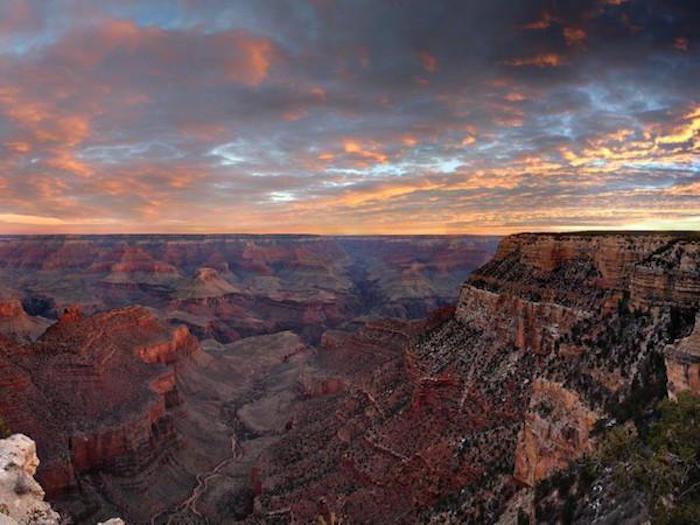
Legislation the House is expected to vote on next week would permanently remove about 1 million acres around Grand Canyon National Park from new uranium mining permits/NPS file
Wilderness protection, a permanent ban on uranium mining near Grand Canyon National Park, and measures that would protect rivers are in a package of public lands legislation expected to reach the House floor for a vote next week.
A number of bills that failed to gain passage in the last Congress are included in this package that U.S. Rep. Raúl Grijalva, D-Arizona, expects will come up for a floor vote on Wednesday.
The package includes Grijalva’s Grand Canyon Protection Act, which was introduced as a standalone bill on Monday; Rep. Joe Neguse’s (D-Colo.) Colorado Outdoor Recreation and Economy Act; and a collection of bills introduced in the last Congress as a package by Rep. Diana DeGette (D-Colo.) under the heading Protecting America’s Wilderness Act.
The bills introduced in the previous Congress as the Protecting America’s Wilderness Act heading and now included in the new package are:
- San Gabriel Mountains Foothills and Rivers Protection Act, Rep. Judy Chu (D-Calif.)
- Colorado Wilderness Act, Rep. Diana DeGette (D-Colo.)
- Northwest California Wilderness, Recreation, and Working Forests Act, Rep. Jared Huffman (D-Calif.)
- Central Coast Heritage Protection Act, Rep. Salud Carbajal (D-Calif.)
- Wild Olympics Wilderness and Wild and Scenic Rivers Act, Rep. Derek Kilmer (D-Wash.)
- Rim of the Valley Corridor Preservation Act, Rep. Adam Schiff (D-Calif.)
The Colorado Wilderness Act would protect some 660,000 acres in Colorado. The 36 areas to be protected under the bill – including Handies Peak, Dolores River Canyon and Little Bookcliffs – "serve as critical habitats for a variety of plants and wildlife," according to a release. "They are also often used by adventurers for a wide-range of outdoor activities, such as hiking, rafting, kayaking, hunting, fishing and mountain climbing."
U.S. Rep. Jared Huffman said his bill “includes protections for wilderness and rivers, but it’s more than that – we’re creating significant new recreation and tourism opportunities, proactively managing forests for fire resilience and watershed health, and remediating harmful trespass marijuana grow sites that have threatened our public lands."
The Wild Olympics Wilderness and Wild and Scenic Rivers Act would protect more than 126,000 acres of public land in Washington as wilderness and 19 rivers and their major tributaries as Wild and Scenic Rivers.
Overall, the Protecting America’s Wilderness and Public Lands Act designates approximately 1.49 million acres of public land as wilderness and incorporates more than 1,000 river miles into the National Wild and Scenic Rivers System. The bill would also withdraw more than 1.2 million acres of public land from new oil and gas and mining claims, ensuring that iconic landscapes like the Grand Canyon and Colorado’s Thompson Divide are permanently protected from the irreversible threats posed by extraction.
You can learn more about the package at this page.
Grijalva on Monday introduced his Grand Canyon bill alongside 16 House Democratic cosponsors to permanently protect the greater Grand Canyon region from new mining claims and the pollution they would produce. Grijalva has made Grand Canyon protection a priority since coming to Congress in 2003, and as chair of the House Natural Resources Committee has drawn together a coalition of Native American communities, conservation advocates, local elected officials, sportsmen and other stakeholders in support of permanently protecting the region from further mining pollution.
The bill – mirroring similar efforts in previous congresses – permanently withdraws slightly more than 1 million acres of federal land north and south of Grand Canyon National Park from eligibility for any future mining claims and leaves valid existing claims intact. The area is currently in the midst of a 20-year moratorium on new claims instituted in 2012 by then-Interior Secretary Ken Salazar. Unless extended, that moratorium will expire in the next decade.
“Of all the places on Earth to protect from mining pollution, the Grand Canyon should be the least controversial,” Grijalva, who chairs the Natural Resources Committee, said Tuesday. “The people of this state, and this country, should never again be subjected to special interest demands that we open the land around one of the wonders of the world to more pollution and exploitation. Nobody, with the exception of a few mining interests and their political apologists, can look into the eyes of the people who live here and say with a straight face that we need to keep having this argument. Protecting the Grand Canyon region is an environmental justice issue, an economic issue, and a moral issue all at the same time, and I’m proud to bring this coalition together to resolve it in the public interest once and for all.”



Comments
Since the situation, including the conflict between conservation of rare Tule Elk and commercial agriculural operations, at Point Reyes has repeatedly been covered and generated so much interest, it might be good to remind readers of what is in Representative Jared Huffman's Northwest California Wilderness, Recreation, and Working Forests Act and how much effort toward resolving that conflict and reforming the management of those park lands is reflected in his proposed legislation.
I'm supportive of this wilderness/lands bill. I would like to see a few things though.
1. Maintain traditional uses of these lands. (Resolve the Point Reyes issue).
2. Permantely de-authorize uranium mining/leasing/claims in the entire Grand Canyon area. (Process uranium at existing sites while cleaning up the tailings).
3. Craft new legislation for the "1872 Minining Law." We need mines but focus on exisiting mines and reclamation. (Clean up the legacy of our mining backcountry).
4. Promote LWCF "Land and Water Conservation Fund" dollars to buying out all NPS and Wilderness Area Inholdings. Forest Service and BLM Inholdings will take longer for a buyout, but work on this as well.
Only about 14% of US land is protected. We must do better to protect biodiversity in our country. Wildlife keeps us alive. We need it. Please protect it.